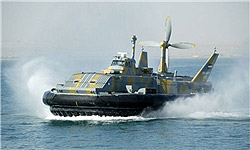Islamic Iran Unveils Home-Made Missile Launching Hovercraft

 Iran on Monday unveiled a highly advanced home-made hovercraft which can launch missiles and serve as launch pad for drones.
Iran on Monday unveiled a highly advanced home-made hovercraft which can launch missiles and serve as launch pad for drones.
The vessel was unveiled in a ceremony attended by the Iranian Defense Minister, Brigadier General Ahmad Vahidi, today.
The newly unveiled hovercraft has been designed and developed by Iranian experts in two models for combat and transportation missions and the combat model, called ‘Tondar” (Thunderbolt), was unveiled by Vahidi today.
Addressing the ceremony, Vahidi said that Tondar can be equipped with different types of weapons produced by the Iranian defense industries, including rockets, guns and Unmanned Aerial Vehicles (UAVs).
The minister said that Tondar can be used for “coastal patrolling, as a command vessel, offensive reconnaissance operations, mid-range amphibious missions, asymmetric defense, as a personnel and equipment carrier for logistical support for islands and coastal areas or as a sea ambulance for relief and rescue missions”.
He further added that the new hovercraft will increase the combat and reconnaissance capabilities as well as the mobility of the Iranian Armed Forces.
The Iranian Armed Forces have recently test-fired different types of newly-developed missiles and torpedoes and tested a large number of home-made weapons, tools and equipments, including submarines, military ships, artillery, choppers, aircrafts, UAVs and air defense and electronic systems, during massive military drills.
Defense analysts and military observers say that Iran’s wargames and its advancements in weapons production have proved as a deterrent factor, specially at a time of heightened threats by the US.







